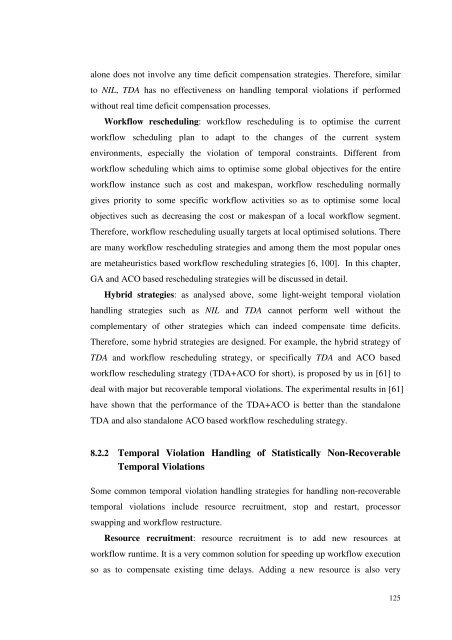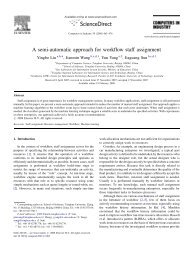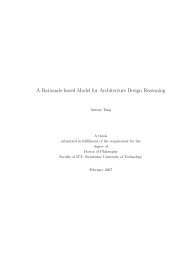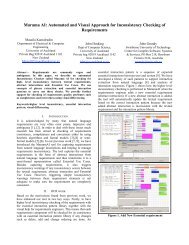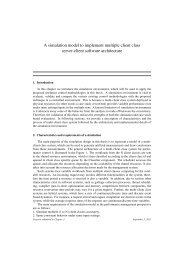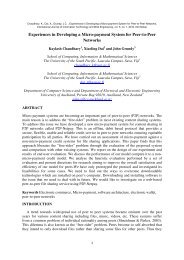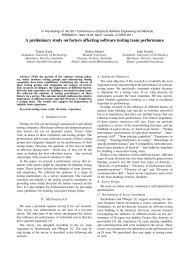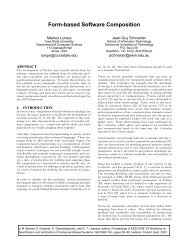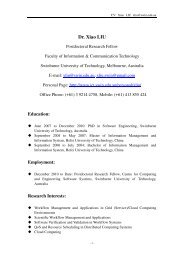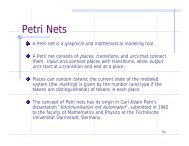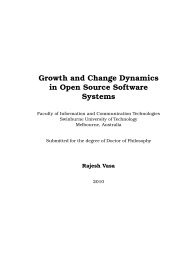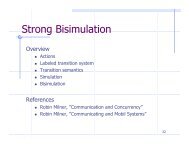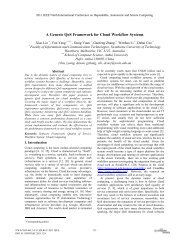Xiao Liu PhD Thesis.pdf - Faculty of Information and Communication ...
Xiao Liu PhD Thesis.pdf - Faculty of Information and Communication ...
Xiao Liu PhD Thesis.pdf - Faculty of Information and Communication ...
You also want an ePaper? Increase the reach of your titles
YUMPU automatically turns print PDFs into web optimized ePapers that Google loves.
alone does not involve any time deficit compensation strategies. Therefore, similar<br />
to NIL, TDA has no effectiveness on h<strong>and</strong>ling temporal violations if performed<br />
without real time deficit compensation processes.<br />
Workflow rescheduling: workflow rescheduling is to optimise the current<br />
workflow scheduling plan to adapt to the changes <strong>of</strong> the current system<br />
environments, especially the violation <strong>of</strong> temporal constraints. Different from<br />
workflow scheduling which aims to optimise some global objectives for the entire<br />
workflow instance such as cost <strong>and</strong> makespan, workflow rescheduling normally<br />
gives priority to some specific workflow activities so as to optimise some local<br />
objectives such as decreasing the cost or makespan <strong>of</strong> a local workflow segment.<br />
Therefore, workflow rescheduling usually targets at local optimised solutions. There<br />
are many workflow rescheduling strategies <strong>and</strong> among them the most popular ones<br />
are metaheuristics based workflow rescheduling strategies [6, 100]. In this chapter,<br />
GA <strong>and</strong> ACO based rescheduling strategies will be discussed in detail.<br />
Hybrid strategies: as analysed above, some light-weight temporal violation<br />
h<strong>and</strong>ling strategies such as NIL <strong>and</strong> TDA cannot perform well without the<br />
complementary <strong>of</strong> other strategies which can indeed compensate time deficits.<br />
Therefore, some hybrid strategies are designed. For example, the hybrid strategy <strong>of</strong><br />
TDA <strong>and</strong> workflow rescheduling strategy, or specifically TDA <strong>and</strong> ACO based<br />
workflow rescheduling strategy (TDA+ACO for short), is proposed by us in [61] to<br />
deal with major but recoverable temporal violations. The experimental results in [61]<br />
have shown that the performance <strong>of</strong> the TDA+ACO is better than the st<strong>and</strong>alone<br />
TDA <strong>and</strong> also st<strong>and</strong>alone ACO based workflow rescheduling strategy.<br />
8.2.2 Temporal Violation H<strong>and</strong>ling <strong>of</strong> Statistically Non-Recoverable<br />
Temporal Violations<br />
Some common temporal violation h<strong>and</strong>ling strategies for h<strong>and</strong>ling non-recoverable<br />
temporal violations include resource recruitment, stop <strong>and</strong> restart, processor<br />
swapping <strong>and</strong> workflow restructure.<br />
Resource recruitment: resource recruitment is to add new resources at<br />
workflow runtime. It is a very common solution for speeding up workflow execution<br />
so as to compensate existing time delays. Adding a new resource is also very<br />
125


